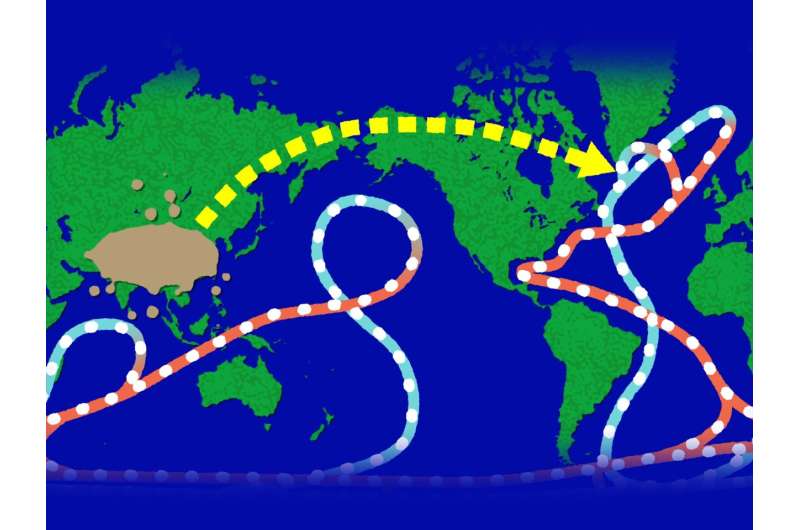This article has been reviewed according to Science X's editorial process and policies. Editors have highlighted the following attributes while ensuring the content's credibility:
fact-checked
trusted source
proofread
Study highlights effect of aerosols over Asia on Atlantic Meridional Overturning Circulation

Since the Atlantic Meridional Overturning Circulation (AMOC) was first monitored in 2004, it has been the focus of thousands of scientific papers and even a blockbuster movie that grossed more than $552 million worldwide.
New research is hoping to add another twist to the current conversation.
Published in Nature Communications, the paper titled "Increased Asian Aerosols Drive a Slowdown of Atlantic Meridional Overturning Circulation" identifies the effect of aerosols over Asia on the AMOC, a complex system of currents in the Atlantic Ocean.
Jian Lu, Earth scientist at the Department of Energy's (DOE's) Pacific Northwest National Laboratory (PNNL), co-authored the article with a team of international scientists from the Ocean University of China and the Max Planck Institute for Meteorology in Germany.
Taking climate center stage
One parcel of water will take about 1,000 years to travel the full length of the AMOC. Often referred to as a conveyor belt, this complex system of currents brings warm water north and cold water south in the Atlantic Ocean, as well as important nutrients.
Lu describes the AMOC like a cell that is continuously turning over its warm layer with its cold layer, keeping the climate of the surrounding continents temperate. He correlates it to the ventilation system in your home. If the AMOC slows or shuts down, it's like turning off the heater in the middle of the winter.
As a crucial component of the Earth's climate, many scientists are scrambling to identify if the AMOC is slowing or if it's possibly close to a collapse.
Impact of anthropogenic aerosols
Lu first worked with Fukai Liu, lead author of the journal article, as a mentor when Liu was a doctoral student. Since then, they have collaborated on several projects, but Lu describes their latest collaboration as the most significant yet.
Scientists have shown that increasing greenhouse gases and the human-causing anthropogenic aerosols over North America and Europe are contributing factors to the AMOC slowdown. Examples of these aerosols include pollution from transportation, coal combustion, and manufacturing.
The impact of Asian aerosols from human activities has been unclear, making the authors' findings that these aerosols are slowing the AMOC significant. Using climate model simulations, they were able to show how the increased anthropogenic emission of aerosols from Asia, which shields the solar heating and cools the Earth's climate, reduces the AMOC's movements.
"Understanding how the Asian aerosols can have an impact 12,000 miles downstream, that finding made this research novel," said Lu. "It was something we didn't know before. The climate is full of surprises."
The team used a combination of existing data from widely used tools, like the Detection and Attribution Model Intercomparison Project (DAMIP) and the Aerosol Chemistry Model Intercomparison Project (AerChemMIP).
The upshot of the study, the authors argue, is that reducing emissions of Asian anthropogenic aerosols will not only lower local air pollution but also help stabilize the AMOC.
More information: Fukai Liu et al, Increased Asian aerosols drive a slowdown of Atlantic Meridional Overturning Circulation, Nature Communications (2024). DOI: 10.1038/s41467-023-44597-x
Provided by Pacific Northwest National Laboratory




















